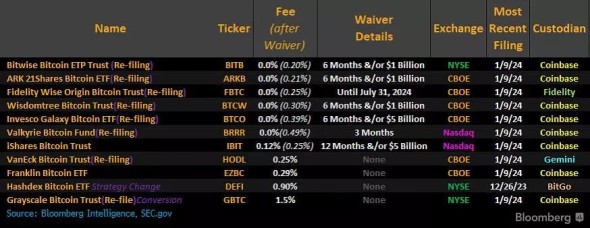After a ten-year wait, the US Securities and Exchange Commission (SEC) has approved the first Bitcoin-based exchange-traded funds (ETFs). The ability to trade their shares should open up access to cryptocurrency for a wide range of investors and become a new source of capital for the crypto market, writes RBC Crypto.
Exchange traded funds (ETFs) have gained popularity over the past two decades, largely due to their convenience and wide range of tools. ETFs give investors access to a basket of assets, such as securities or commodities, that can be traded as shares on stock exchanges. By trading ETF shares, an investor can profit from changes in the prices of underlying assets without interacting directly with them.
The legal status of cryptocurrency in the US remains opaque, but a Bitcoin-based ETF allows regulated entities to legally invest in it without having to deal with the cryptocurrency itself. North America accounts for nearly a quarter of all crypto asset transactions, with the US market being more dependent on institutional activity than other regions.
10 years of trying
The so-called spot Bitcoin ETF, that is, one that tracks the actual market price of the cryptocurrency and involves its delivery as an underlying asset, has been rejected by the SEC for more than a decade. The first such fund was unsuccessfully attempted to be created by twin brothers Tyler and Cameron Winklevoss, now the owners of the Gemini cryptocurrency exchange, back in 2013. In June 2023, the world's largest management company BlackRock filed an application to register a Bitcoin ETF.
In rejecting applications from a dozen applicant companies, the SEC cited the immaturity of the crypto market, the abundance of scammers and the possibility of manipulation of cryptocurrency prices. In 2021, the agency approved several Bitcoin futures ETFs that trade derivatives on stock exchanges, but the transactions of such funds did not have an impact on the market.
The situation changed after Grayscale, which has operated the largest Bitcoin trust since 2013, sued the SEC in 2022, challenging its refusal to launch Bitcoin spot funds while approving futures funds. Its trust, Grayscale Bitcoin Trust (GBTC), also allows accredited investors to invest in Bitcoin in the form of shares, but is not allowed to trade on major exchanges and has many other restrictions. The company's original plans were to convert the trust into a full-fledged ETF. In August 2023, Grayscale won a lawsuit with the SEC. According to Commission Chairman Gary Gensler, it was the Grayscale case that became a turning point for changing the regulator’s rhetoric.
The past few months have been filled with speculation about when exactly a Bitcoin ETF might receive SEC approval, as well as how the mechanisms associated with the new products would work. After numerous meetings of potential issuers with representatives of the department, the regulator agreed with them on a model for issuing and redeeming fund shares, which in fact became the final stage of their registration and future listing on exchanges.
The race to become the first mover in the Bitcoin ETF market has attracted major players from both the worlds of traditional finance and cryptocurrencies. While BlackRock remains the largest issuer due to its capital size and dozens of proprietary ETF products, other approved companies include Fidelity, Franklin Templeton and Cathie Wood's ARK Invest. The list of 11 organizations that were approved to launch ETFs also included eminent representatives of the crypto business – Grayscale, Hashdex and Valkyrie.
 List of spot Bitcoin ETFs and information about their listing on exchanges. Source: Bloomberg
List of spot Bitcoin ETFs and information about their listing on exchanges. Source: Bloomberg
Other companies have also benefited from the creation of ETF infrastructure. The largest cryptocurrency exchange in the United States, Coinbase, provides Bitcoin custody for most issuers, with firms such as Jane Street or Virtu acting as authorized market makers.
Once spot ETFs are approved and their shares begin trading on exchanges, one thing to keep an eye on is how much capital will flood into the newly opened market, as well as which of the 11 issuers will capture the largest share of it.
Digital gold
More than $100 billion now stored in existing gold ETFs whose shares are traded on the US stock market. These ETFs make investing in the precious metal as easy as investing in any asset available in a regular brokerage account—without the need for vaults or armed guards. Similarly, a Bitcoin ETF investor does not need to independently deal with crypto wallets, exchanges and expose himself to the risks of hacker attacks or scammers.
Without ETFs, institutional investors in the US are limited in their ability to invest in cryptocurrency. Most do not have the infrastructure to directly store Bitcoin or allow it to be traded on existing exchanges, so they can invest through either futures ETFs or closed-end funds such as Grayscale's GBTC. In addition, shares of mining companies act for them as a so-called proxy investment in cryptocurrency. The convenience of a legal ETF traded on the NASDAQ and NYSE eliminates any of these limitations.
The first gold ETFs appeared 20 years ago, and since then the price of the metal has quadrupled. Standard Chartered Bank projects this story onto Bitcoin. The bank's analysts expect Bitcoin to rise in similar proportions as a result of the approval of spot ETFs in the United States, but in their opinion this will take a shorter period (one to two years). The bank predicts that the price of Bitcoin will rise to $100 thousand by the end of 2024.
In 2023, Bitcoin soared in price by more than 150%. Much of this growth followed BlackRock’s June application to create an ETF; prior to that, Bitcoin was trading at $25,000. At the time of publication of this material, the rate of the first cryptocurrency is at $47,000 with a capitalization of more than $926 billion.
Analysts at CryptoQuant allowthat the approval of ETFs could increase the total capitalization of all cryptocurrencies by another $1 trillion. These numbers, while still projections, show that ETF approval could not only provide a long-term boost to the price of Bitcoin itself, but could also positively impact the entire crypto industry through the influx of institutional capital.
Source: Cryptocurrency
I am an experienced journalist and writer with a career in the news industry. My focus is on covering Top News stories for World Stock Market, where I provide comprehensive analysis and commentary on markets around the world. I have expertise in writing both long-form articles and shorter pieces that deliver timely, relevant updates to readers.







